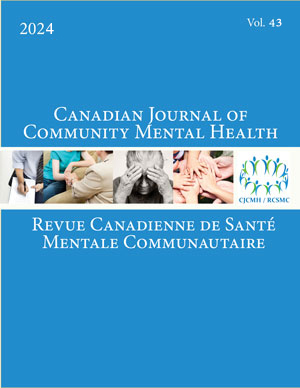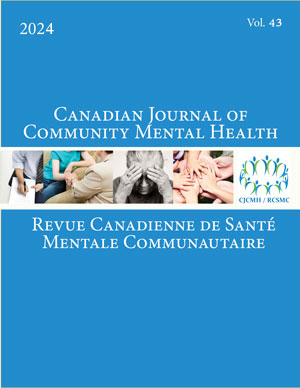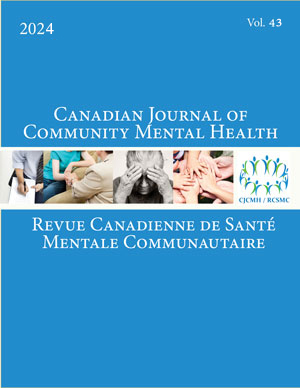Volume 15 • Number 1 • April 1996
OPEN ACCESS
Fifty-one persons with psychiatric disabilities in housing programs in the Ottawa-Carleton area were compared with a matched sample of 51 community residents on several aspects of community integration and subjective quality of life. Matching criteria included sex and location (i. c., living within one square block). Results showed persons with psychiatric disabilities reporting lower levels of social contact with neighbours and general life satisfaction than community residents. Both groups showed similar levels of physical presence and sense of community in the neighbourhood. Implications of the findings for planning and improving community mental health services are discussed.
OPEN ACCESS
Despite evidence confirming the value of employment in promoting and maintaining mental health, efforts aimed at work integration of mental health consumers have met with limited success. Using qualitative research methods, this study explores the consumer perspective on factors influencing the process of employment integration. A sample of five consumers of the mental health system who were employed at the time of the study was used. Two data collection instruments, a semi-structured interview and demographic questionnaire, were utilized. The study draws on grounded theory (i.e., the constant comparative method of analysis) including unitizing, categorizing, and forming themes to process the data. Descriptive statistics were used to analyze demographic information. Four themes emerged from the data: (a) the importance of recognizing the mind-body connection, (b) the relationship of personal empowerment to work reintegration, (c) the need for skills and supports, and (d) the relationship of the work environment to the outcome of work reintegration.
OPEN ACCESS
This study investigated the meaning of the emotional abuse experience for six women co-researchers, using an existential-phenomenological approach. Their experiences show a number of shared themes. All were emotionally abused in their families of origin and all described similar stages in their reactions to the abuse. All experienced an almost total loss of self in the partnership relationship and all identified the same key components as being critical to their healing process. Many factors appear to contribute to the development of emotional abuse, including cultural norms that do not encourage the nurturing of independence and self-esteem in females.
OPEN ACCESS
The research relationship within qualitative research methods, that is, the relationship between researcher and research participant, is reexamined in this paper We draw upon our own research experiences of working with high-risk individuals and vulnerable communities in reframing a discussion of the interview process. We illustrate the emotionally provocative and volatile nature of the research relationship and argue for the necessity of social research protocols which extend beyond a utilitarian research framework, the expansion of the researcher's role to include skillful navigation of the intersubjective aspects of research interviewing, and participant advocacy.
OPEN ACCESS
Cette recension porte sur l'impact des interventions de soutien intensif offertes à des familles dont un enfant présente un risque de placement. Bien que l'on ne sache pas clairement dans quelle mesure l'intervention permet d'éviter les placements, l'on constate que les enfants ayant bénéficié des services sont placés plus tard, moins longtemps, et dans des ressources moins restrictives. Les données concernant le fonctionnement familial présentent des améliorations qui se manifestent dans le comportement de l'enfant, le fonction-nement général de la famille, et l'enrichissement de son réseau de soutien. La discussion porte sur les principales limites méthodologiques liées à l'évaluation de ces programmes.
OPEN ACCESS
A participatory evaluation was conducted in an organization that promotes community economic development. This approach reflects current changes in the practice of evaluation which fosters the empowerment of stakeholders, enabling them to conduct an evaluation centering on their issues of concern and allowing them to utilize the results in program planning. In the present investigation, stakeholders chose to assess the visibility and credibility of the organization in the community. Data were gathered by consulting 20 workers from 13 local organizations. The results of a qualitative analysis of these data are reported for each of five ecological factors that promote a process of empowerment among members of a setting.










